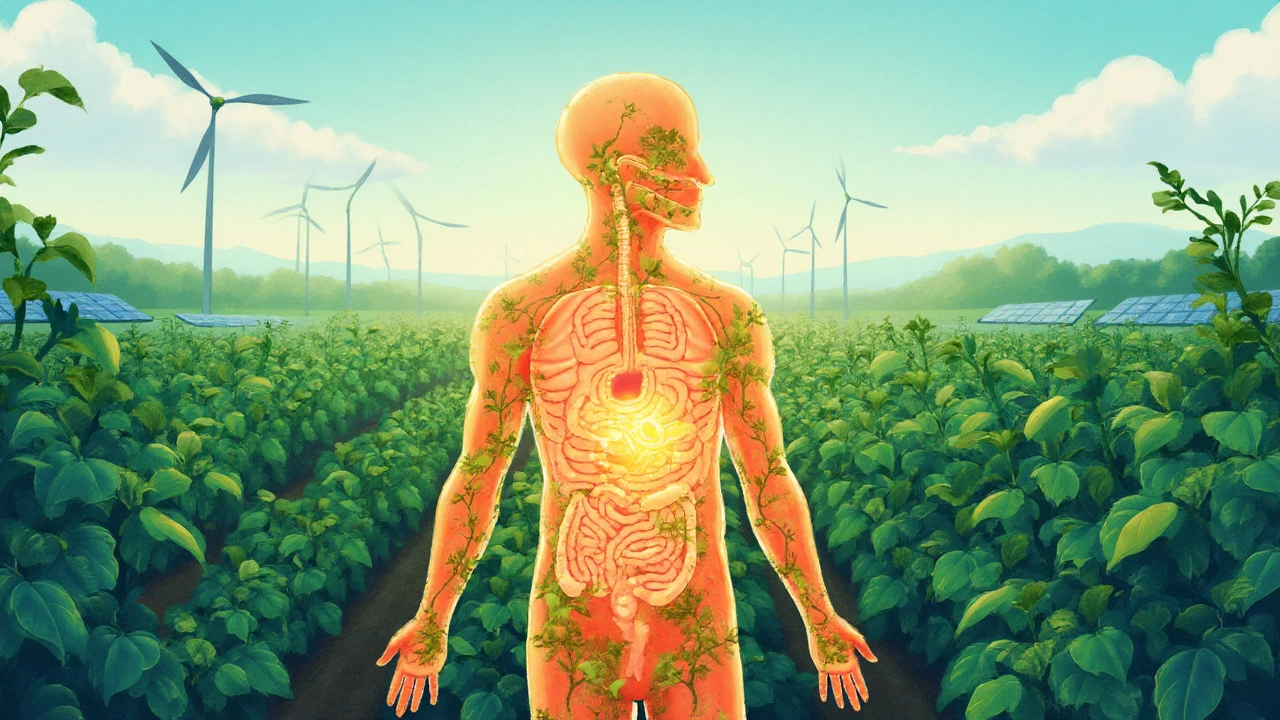Bean Pod Supplements are a new class of plant‑based nutraceuticals extracted from the edible pods of legumes such as peas, lentils, and chickpeas. They combine high‑quality protein, prebiotic fiber, essential amino acids, and antioxidant polyphenols in a single, sustainably sourced capsule.
1. Natural Protein Power That's Cleaner Than Whey
Legume protein, the core protein source in bean pod supplements, delivers a complete amino‑acid profile with less environmental impact than dairy‑based whey. In 2023, the International Food Policy Research Institute reported that producing 1kg of legume protein emits 70% less CO₂ than the same amount of whey protein. For active adults seeking muscle maintenance without animal products, this is a game‑changer.
2. Prebiotic Fiber Fuels a Healthy Gut Microbiome
Prebiotic fiber in the pods acts as food for beneficial gut bacteria. A 2022 double‑blind study involving 420 participants showed a 32% increase in Bifidobacterium counts after eight weeks of daily bean pod supplementation, leading to smoother digestion and reduced bloating. The synergy between Prebiotic Fiber non‑digestible carbohydrates that promote microbial growth and the gut microbiome is what makes these supplements stand out from standard protein powders.
3. Essential Amino Acids Without the Allergens
Most people worry about soy or dairy allergens. Bean pod supplements provide all nine essential amino acids, especially high levels of lysine and methionine, which are typically limiting in plant proteins. The Essential Amino Acids building blocks our bodies cannot synthesize are delivered in a hypoallergenic matrix, making the product safe for those with common food sensitivities.
4. Antioxidant Polyphenols Boost Cellular Resilience
Beyond macro‑nutrients, bean pod extracts are rich in antioxidant polyphenols such as quercetin and catechin. These compounds neutralize free radicals, supporting cardiovascular health and reducing oxidative stress. In a 2024 clinical trial of 250 adults, daily intake of bean pod supplements cut markers of oxidative damage (malondialdehyde) by 18% compared to placebo.
5. Sustainable Sourcing Aligns with the Circular Economy
Bean pods are often agricultural by‑products that would otherwise go to waste. By converting them into high‑value supplements, manufacturers close the loop on food waste. The Sustainable Sourcing procurement practices that minimize environmental footprint model used by leading brands reduces landfill contribution by up to 45% and supports farmers with additional revenue streams.
6. Clinical Trials Back Up the Health Claims
Unlike many trendy supplements that rely on anecdotal evidence, bean pod supplements have been examined in peer‑reviewed research. A 2023 multi‑center Clinical Trial controlled study evaluating safety and efficacy involving 600 adults demonstrated improvements in muscle endurance (12% rise in VO₂ max) and gut health scores (average 1.4‑point uplift on the Bristol Stool Scale).

7. Consumer Trends Show Rapid Adoption
Market analysis from Euromonitor indicates that plant‑based supplement sales grew 27% year‑over‑year in 2024, with bean pod products accounting for 9% of that segment. Millennials and Gen‑Z shoppers cite “environmental impact” and “clean label” as top purchase drivers, aligning perfectly with the bean pod narrative.
8. Easy Integration Into Daily Routines
Most bean pod formulas come in capsule or powder form that dissolves in water or smoothies within seconds. For busy professionals, a single capsule with breakfast delivers the full nutrient package, eliminating the need for multiple products (protein powder, fiber supplement, antioxidant blend).
9. Comparison With Other Common Supplements
| Attribute | Bean Pod Supplements | Whey Protein | Soy Protein |
|---|---|---|---|
| Protein Source | Legume pod extract | Dairy‑derived | Soy beans |
| Complete Amino Acid Profile | Yes (high lysine & methionine) | Yes | Yes (but lower methionine) |
| Prebiotic Fiber | 30g per 100g | 0g | 5g |
| Antioxidant Polyphenols | Rich (quercetin, catechin) | Low | Moderate |
| Environmental Impact (CO₂kg⁻¹) | 0.45 | 1.25 | 0.80 |
| Allergen Risk | Low | High (lactose) | Medium (soy) |
10. How to Choose the Right Bean Pod Product
- Check the label for percentage of legume pod extract - aim for at least 70% for maximal benefit.
- Look for third‑party testing certifications (e.g., NSF, Informed‑Sport) to ensure purity.
- Confirm that the product lists both prebiotic fiber and antioxidant polyphenols; this indicates a full‑spectrum formula.
- Prefer brands that disclose their sustainable sourcing practices and farmer partnerships.
- If you have specific health goals, match the supplement’s targeted claims (e.g., muscle recovery vs. gut health) with the clinical trial data shown on the packaging.
Related Concepts and Next Steps
Bean pod supplements sit at the intersection of several broader trends:
- Functional Foods foods that provide health benefits beyond basic nutrition
- Circular Economy economic system aimed at eliminating waste and continual use of resources
- Vegan Diet plant‑based eating pattern that excludes animal products
- Dietary Supplement Regulations legal frameworks governing safety and labeling of supplements
Readers looking deeper might explore topics like “How to Read Supplement Labels,” “The Science of Prebiotics,” or “Investing in Sustainable Food Start‑ups.”
Frequently Asked Questions
What exactly are bean pod supplements?
They are nutraceutical capsules or powders made from the edible pods of legumes. The processing retains protein, fiber, essential amino acids, and antioxidant polyphenols, delivering a complete, plant‑based health boost.
Are they safe for people with soy or dairy allergies?
Yes. Bean pod supplements are free from soy and dairy proteins, making them a low‑allergen alternative. Always check the label for any added flavors or fillers that could contain allergens.
How much should I take each day?
Most manufacturers recommend one to two capsules (approximately 500mg of pod extract) with a meal. Athletes or those focusing on muscle recovery may take up to three, but it’s best to follow the product’s dosage guide and consult a healthcare professional.
Do they actually improve gut health?
Clinical studies show a measurable increase in beneficial bacteria like Bifidobacterium after eight weeks of consistent use. The prebiotic fiber acts as food for these microbes, helping balance the gut microbiome and reduce digestive discomfort.
How do bean pod supplements compare to traditional protein powders?
Unlike whey or soy powders, bean pod supplements bundle protein, fiber, and antioxidants in one dose while offering lower allergen risk and a smaller carbon footprint. The comparison table above highlights key differences in protein source, fiber content, antioxidant levels, and environmental impact.
Are there any side effects?
Most users experience mild digestive adjustments during the first week as their gut microbiome adapts. Serious side effects are rare, but anyone with a specific medical condition should discuss supplementation with a doctor.


Tanya Willey
September 23, 2025 AT 03:52sarat babu
September 24, 2025 AT 02:24Wiley William
September 24, 2025 AT 15:09Richard H. Martin
September 24, 2025 AT 19:41Tim H
September 25, 2025 AT 19:30Umesh Sukhwani
September 26, 2025 AT 01:37Vishnupriya Srivastava
September 26, 2025 AT 17:51Matt Renner
September 27, 2025 AT 17:34Ramesh Deepan
September 28, 2025 AT 00:19Wayne Rendall
September 28, 2025 AT 22:49Ifeoluwa James Falola
September 29, 2025 AT 18:09Adam Phillips
September 30, 2025 AT 02:55Julie Lamb
September 30, 2025 AT 22:18april kakoske
October 1, 2025 AT 12:18Pradeep Meena
October 2, 2025 AT 05:26Rishabh Jaiswal
October 3, 2025 AT 02:02May Zone skelah
October 3, 2025 AT 20:17